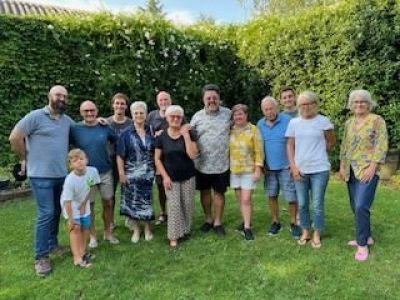L'articolo descrive i ricordi di Jason Lorenzon e dei suoi viaggi a Mossa, nel Friuli-Venezia-Giulia. Ogni volta che Jason andava in italia per trovare la sua famiglia, ascoltava molte storie di suo padre e dei suoi zii durante la seconda guerra mondiale. La sua famiglia raccontava delle difficoltà che hanno avuto soprattutto quando hanno dovuto nascondersi dai nazisti. Jason racconta che con ogni viaggio, imparava nuove storie sulla dura vita della sua famiglia. Si rese conto dell'importanza di mantenere i legami con la famiglia anche se la distanza poteva essere grande.
As the son of an Italian immigrant, my lifelong curiosity about my Italian roots and the country resembling a boot has been a driving force. Gazing at pictures of the Friulani Region near Gorizia, Italy, where my father grew up, fueled my desire to explore. However, it wasn't until I turned 18 that my plea to revisit his childhood home became a reality.
Hailing from a family of 12 children, my father's roots ran deep and my long-awaited trip to meet aunts, uncles, and numerous cousins began in Venice. In 1989, the unexpected eight-hour drive to Mossa, Italy, where one of my aunts resided, unfolded a journey far beyond the usual hour and a half. This marked the beginning of a profound connection with my family's history.
In 2000, an invitation to participate in the Marcello Galanti International Organ Competition provided an opportunity to return to Italy. My sponsor, recognizing the importance of my Italian heritage, covered the expenses for my father to join as my interpreter. While securing the second position in the competition was significant, it was the memorable journey from Rimini to Mossa that left an indelible mark. Each return to Italy with my father brought forth more stories of his upbringing and the challenges faced by my entire family during WWII.
My father's childhood in Cerovo, now Slovenia, amidst its beauty, took a turn during WWII, forcing the family to relocate to Capriva and the historic "Castello Di Spessa." Built in the 13th century, the castle hosted illustrious guests like Giacomo Casanova and Lorenzo Da Ponte. The encounter between Casanova and Da Ponte inspired the opera Don Giovanni, a revelation I recently uncovered.
The third and final return to Italy in 2008 with my father, this time as a judge at the Marcello Galanti International Organ Competition, provided an opportunity for my eight-year-old daughter to meet her great aunts. Visiting Mossa, I learned about my grandmother's cooking and the challenges faced during the Nazi occupation. The Castello Di Spessa, once a Nazi bunker, held poignant memories of resistance and sacrifice for my family. During WWII, the Nazis seized control of Castello Di Spessa, erecting a bunker on the grounds. My father often recounted the constant yelling, instilling fear in his family and others. He shared a harrowing tale of the Resistance, where a Partisan shot and killed a Nazi soldier. In retaliation, for every fallen Nazi, three Italian families faced execution. Regrettably, my family was one of the three targeted. However, at the age of 10, my father along with other members of my family, managed to escape, and he showed me the location where he concealed himself for over a month, evading the Nazis. The eventual arrival of liberation day granted my father the freedom to reunite with his family.
My father's account of evading the Nazis at 10-years-old, coupled with the reconstruction post-war period, revealed the resilience of my family. In 1953, my grandfather's dying wish led my father to the new world, shaping a new chapter in our family's journey. Growing up, my father seldom spoke of his Italian childhood, but as I visited Italy in later years, he opened up, revealing layers of our family history.
Last summer, staying at the Castello with my wife, I marveled at its transformation into a tourist lodge, offering modern amenities, three restaurants, and a spa. The winery, a highlight, showcased the legacy of my grandfather's wine, "Tocai" (now "Rausser"), a sweet and lighthearted reflection of his personality. Sharing this discovery with my cousin in Gorizia validated our family lore. My cousin emphatically told me that my grandfather created that wine, it is his.
Returning to Italy is always a joyous occasion, an opportunity to reconnect with family, share meals, and revel in the bonds that transcend generations. Polite reminders of being the youngest cousin highlight the longevity of our family, where the oldest cousin is around 100-years-old. Language barriers among second and third cousins fade with the help of tools like Google Translate.
In essence, my message is: return to Italy, rediscover your roots, and honor the treasures you find. Visiting my grandparents' gravesite becomes a heartfelt ritual, expressing gratitude for their sacrifices that paved the way for my family's journey to Canada and my journey to the U.S. It is in this spirit and those roots that my life has been blessed with the enduring legacy of their sacrifice.
-
 Statue of Casanova...
Statue of Casanova...
Statue of Casanova...
Statue of Casanova...
-
 Inside the Castillo...
Inside the Castillo...
Inside the Castillo...
Inside the Castillo...
-
 Visit to the...
Visit to the...
Visit to the...
Visit to the...
-
 Visiting with my...
Visiting with my...
Visiting with my...
Visiting with my...
https://www.lagazzettaitaliana.com/travel/10355-embracing-my-italian-heritage-a-journey-of-discovery-family-and-sacrifice#sigProIddc9438a278



